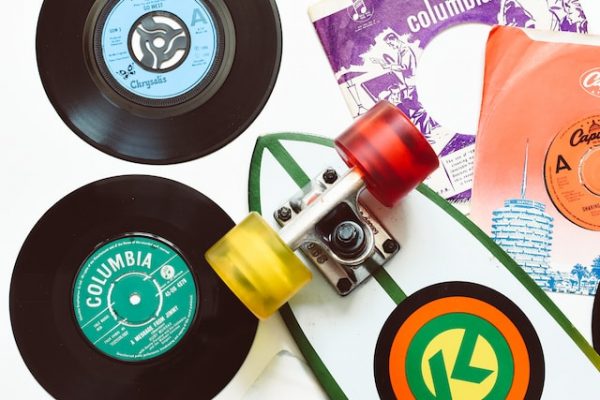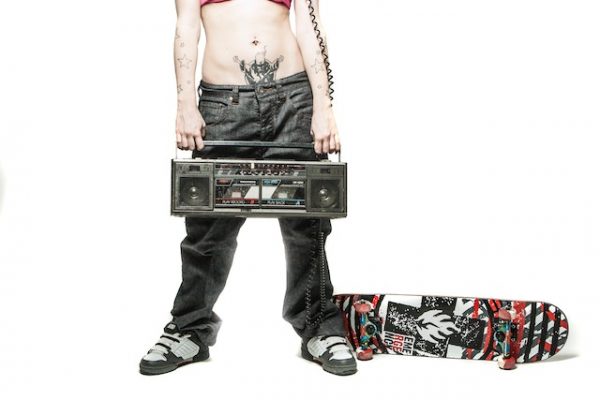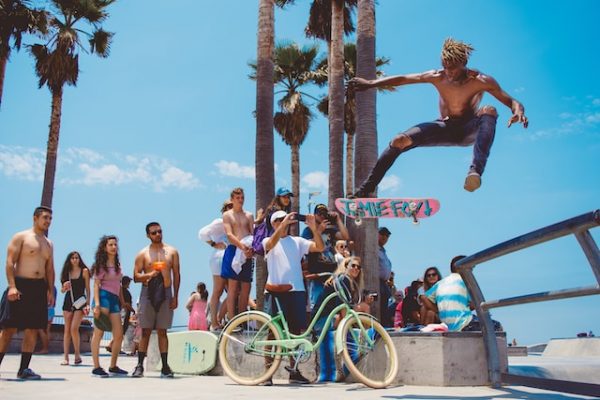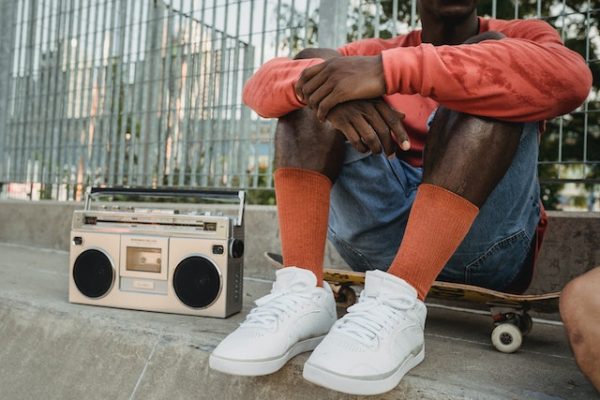We’ve seen the effortless blend of music culture and skateboarding, two vibrant subcultures intertwining together for self- expression. From the laid-back vibes & music of the 1960s to the ’70s, through the raw energy of skate punk to punk rock music in the ’80s, into today’s eclectic music culture, the dynamic duo of music culture & skateboarding has evolved together.

Key Takeaways
We’ve journeyed through decades of music culture, plus riding a skateboard. From skate pop-punk to hip-hop skating & onto modern influences, they’ve formed an unbreakable bond among skateboarders and musicians. Iconic collaborations have shaped our perception of both worlds. The skateboard has seen many forms over the years – from the traditional longboard & cruiser board to the modern street deck & the contemporary electric skateboard.
Skateboarders have had a wealth of styles to choose from, heavily influenced by music & collaborations with musicians & bands on limited-edition decks & skateboarding apparel. As we look forward to the future, we can’t help but feel excited about what’s next for these two intertwined social norms.
- Symbiotic Evolution: Witnessed a dynamic evolution linking different artistic expressions with riding styles, from pop-punk and hip-hop to contemporary influences.
- Impactful Collaborations: Influential collaborations have shaped perceptions and trends within both realms. We have seen artists and newbies in the world of longboard collaborate with each other. Artists have also launched several inspiring melodies that make longboarding exciting.
- Variety of Riding Styles: Riders have seen styles evolve from traditional designs to modern and electric alternatives.
- Influence on Product Design: A variety of styles and products, including limited-edition designs and apparel, have been heavily influenced by collaborations with artists and bands.
- Historical Performances: Notable performances, such as the 1985 event in Los Angeles, highlight the platform provided for live performances, reinforcing the bond between these communities.
- Ongoing Evolution: Both communities continue to evolve, promising more groundbreaking collaborations. It’s absolutely fun and exciting for riders and the entire community.
- Technological Advancements: Advancements in technology enable explorations and new forms of expression, enhancing connectivity and interaction with fans. Technology helps shape the future of longboarding, inspiring both experts and newbies to experiment on brand new tricks.
Music culture & skateboarding have also had a huge influence, providing the perfect platform for musicians to perform their music live, such as when Red Hot Chili Peppers & Run DMC performed together at the 1985 Los Angeles Coliseum Skateboard Competition. This collaboration, plus many others, has helped shape the skateboarding & music that we know today. As both continue to evolve together, we can expect to see more iconic collaborations in the future. With the advancement of technology, many skateboarders & musicians alike will be able to explore & experiment with new skateboard and music ideas, finding new skateboard tricks & skateboard ways to express themselves through their skateboards & reach their skateboarding fans in new & exciting ways.
The Beginnings
You might not believe it, but in the 1960s through the 70s, the early beginnings of a unique blend between music culture & skateboarding were already taking root. Skateboarders were drawn to the punk rock era of the 1980s as it amplified the relationship between the two. Designs evolved to incorporate more innovative skateboarding tricks influenced by the tunes of the era. Let’s take a look at the skateboarding culture that’s passed including the skateboard music.
The Punk Rock Era
As we delve into the 1980s, we find ourselves immersed in a bold era where punk rock & skateboarding rebellion came to prominence. This decade saw an indelible influence of punk aesthetics on skating, stirring up a revolution that would shape both worlds for years to come. We’ll explore how this edgy style fueled the daring spirit & led to a unique fusion of gritty artistry & rebellious attitude.
Punk And Rock Skateboard

It was punk rock’s raw energy & rebellious ethos that drove the rise of skateboard culture in the late 70s through the early 80s. We rebelled against mainstream norms & rocked skateboarding fashion with wild abandon. Punk’s political skate influence & skate aesthetics had a deep impact, inspiring us to explore skateboarding.
As we celebrate the rise of skateboarding & punk music, let’s take a moment to recognize the impact that this rebellious culture has had on our society.
Music Culture: Influence Of Punk Aesthetics
The influence of music culture is undeniable & deeply rooted. From fashion to DIY skateboard building, punk has shaped tradition & allowed skateboarding music to flourish.
Punk influence embraces individuality, while the DIY ethos embodies the spirit of self-expression & defiant artistry. Customized skateboards are also a testament to the punk influence on skateboarding norms.
The deep connection between punk skate music aesthetics & social norms makes sense, shaping the skateboarding community into what it is today.
Longboard Melody: Hip-Hop Connection
Skateboarding & hip-hop culture of the 1990s through the early 2000s found a special connection in the form of their shared gritty, street-smart ethos, with artists like Gang Starr playing a significant role in shaping the fusion, which was fueled by the influence of skateboarding music. Both movements were characterized by rebellion, creativity, & resilience in our communities. This emotional bond between them helped to bring street art & breakdancing, creating an ever-evolving sound & influence that continues to shape skateboard culture today.

Additionally, skateboarding has been a way for people to express themselves artistically and to build a sense of community through skate parks, videos, and competitions. A skate video captures their impressive tricks and skills, allowing skateboarders to showcase their talent and creativity to a broader audience. Furthermore, it has also become an important part of culture and fashion, particularly streetwear, and its influence on music culture has been prominent in the hip-hop scene. As a result, skateboarding and hip-hop continue to have an impact on social norms and the world, inspiring people to let their creativity and passion flow.
Longboard Melody: Modern Influences
During the 1990s, skateboarding music experienced a surge in popularity, with bands like Green Day providing the perfect songs to jam to. As the music continues to evolve, the soundtracks to our rides have also evolved. The 2010s to the present have seen a dynamic shift in skateboarding and music, entering digital skateboarding and techno influence.
Technology has allowed for enhanced soundscapes, with techno beats pulsating on every flip and grind. Skaters now have access to a wide range of genres, including rock, hip-hop, EDM, and alternative, allowing them to create their own unique soundtracks for their rides.
As we ride this wave of innovation, let’s take a moment to look back at some of the memorable moments when both collided.
- Surge in Popularity: The 1990s saw a significant increase in popularity with bands like Green Day enhancing the riding experience.
- Evolving Soundtracks: From the 2010s to the present, there has been a dynamic shift with digital influences and techno beats enhancing the atmosphere of every move.
- Diverse Genres: Riders now enjoy a broad spectrum of genres such as rock, hip-hop, EDM, and alternative, allowing for personalized soundtracks.
- Innovation in Riding: Ongoing technological advancements continue to innovate and enhance the riding experience. This is one of the most eventful experience that most riders can have.
- Reflection on Memorable Moments: Taking time to reflect on key moments where technological and creative expressions have intersected.
- Tradition Significance: Acknowledging the deep impact and the role of riding in personal expression and community identity.
- More Than a Hobby: Recognizing riding as a passion and a potent means of self-expression among enthusiasts.
We recognize the importance of skateboard culture and the role it plays in the lives of many. We believe that skateboarding is more than just a hobby; skateboarding is a passion, and it can be a powerful form of self-expression.
Music Culture And Skating Collaborations
Diving into the world of iconic collaborations, there’s a profound history where the worlds of melody and wheels have intertwined in unforgettable ways. From skate-inspired album covers to music festival skate parks, these partnerships have amplified both music culture & traditions.
- Historical Collaborations: There’s a rich history of memorable partnerships between the worlds of melody and wheels.
- Influence on Album Art: Album covers inspired by riding have amplified both artistic expressions and traditions.
- Song Festival Integrations: Integration of parks at music festivals, blending live performances with riding activities.
- Jamie Zebulon’s Contributions: During the early 2000s, artist Jamie Zebulon worked with singers to create tunes that resonated well within the riding community.
- Community Resonance: These collaborations have significantly influenced and resonated within the riding community, fostering a unique blend of artistic and physical expression.
Jamie Zebulon, one of the talented artists, collaborated with musicians during the early 2000s to create unique skateboarding music that resonated with the skateboarding community.
Future Of Music Culture & Skating
Having explored iconic collaborations, let’s now look ahead. As we stride into the future, innovative skateboarding designs and virtual reality skating are set to revolutionize both skateboarding and music.

As music culture and skateboarding continue to intertwine, we can look forward to more creative designs, engaging events, and meaningful collaborations between skateboard brands and music labels.
- Innovative Designs: Anticipating revolutionary designs in riding equipment that merge functionality with aesthetic appeal. The designs of longboards nowadays are sleek and modern, inspiring everyone to make good of what they have. Riders love to ride on.
- Virtual Reality Enhancements: Exploring the potential of virtual reality to transform the experience of riding and performance. Today, riders can practice using virtual reality, without even literally riding on the streets.
- Continued Integration: Expecting ongoing fusion of artistic expressions and riding, enhancing both fields.
- Creative Collaborations: Looking forward to new collaborations between riding brands and artist labels, promising exciting developments.
- Engaging Events: Anticipating more engaging and immersive events that bring together enthusiasts from around the world.
- Redefining Engagement: Envisioning a redefined global engagement that continues to build on the tradition cherished by riders. Melodies from artists can inspire riders to make new moves and tricks that fit the specific beat. It’s the beat of the drum and the lively notes that keep everyone moving. Jive to the beat!
- Thrilling Experiences: Preparing for thrilling new experiences that push the boundaries of technology and creativity in both industries
These will bring thrilling new experiences to both skateboarding and music industries while redefining the way we engage around the world. This has been a cherished tradition among skaters for decades.
Conclusion
We’ve journeyed through decades of music culture and skateboarding. From punk rock skate music to hip-hop skate music and modern influences, they’ve formed an unbreakable skateboard bond. Iconic music collaborations have shaped our perception of both worlds. Specifically, skating culture has carved its own unique path. Meanwhile, skateboarding culture has acted as a more specific subset, emphasizing street art, deck designs, and brand affiliations.
The skateboard has seen many forms over the years – from the traditional longboard and cruiser board to the modern street deck, perfect for street skating, and even the emergence of electric skateboards. Skateboarders have had a wealth of styles to choose from, often influenced by iconic bands like Black Flag.
Skateboarders have also provided the perfect platform for musicians to perform their skate music live. For instance, when Red Hot Chili Peppers and Run DMC performed together at the 1985 Los Angeles Coliseum Skateboard Competition, they showcased the potent skate synergy between music and skateboarding. This collaboration has been immortalized in skate music videos, shaping the skateboarding world.
As both cultures continue to evolve, collaborations remains high. Advancements in skate technology will offer new avenues for individual creativity, allowing skateboarders to express themselves in unique ways through their skateboards while also enabling musicians to connect with their fans in innovative fashions.
Frequently Asked Questions (FAQs):
What’s Skateboard Musicality & Cultures?
The skateboarding culture is a vibrant subculture characterized by self-expression, creativity, and a sense of community among skateboarders.
What Music Genre Do Skaters Usually Listen To?
Skaters listen to a diverse range of music genres, but punk rock music, hip-hop music, hard rock music, and alternative music are particularly popular within the skateboarding community.
Is Riding A Skateboard Considered A Part Of Hip-Hop Tradition?
While skateboarding has been influenced by hip-hop culture, there are connections between the two; skateboarding itself is a distinct subculture with its own history and identity.
What Is Skater Music?
Skater music refers to the genre of music commonly associated with skateboarding, which includes punk rock bands like Black Flag music, hip-hop music, alternative music, indie music, and bands like Sonic Youth.
What Is A Skater-Boy Personality?
A laid-back attitude, a passion for skateboarding, and a love for alternative music and street culture often characterize a skater-boy personality.
What Are The Most Common Injuries And Accidents People Encounter When Riding A Board?
- The most common injuries in skateboarding include ankle sprains, wrist fractures, and injuries to the knees and elbows from falls and collisions while practicing tricks.
What Does Riding A Board Symbolize For Most People?
- Skateboarding symbolizes freedom. Skateboarding is often seen as a form of art and self-expression, allowing skaters to push boundaries and challenge societal norms.
Is Riding A Board Harder For Girls Than It Is For Boys?
- Skateboarding can present unique challenges for girls due to social stigmas and the limited popularity representation in the skateboarding community. However, with dedication and support, girls can excel in skateboarding just like their male counterparts.
Can Riding A Board Be A Career?
- Yes, skateboarding can be a career for some individuals, especially for professional skateboarders who compete in events, participate in sponsorships, and generate income through their skateboarding skills.
Do Board Riders Get Hurt A Lot? How Do They Cope?
Last Updated on June 11, 2024 by Mary Cimeni
DISCLAIMER (IMPORTANT): This information (including all text, images, audio, or other formats on FamilyHype.com) is not intended to be a substitute for informed professional advice, diagnosis, endorsement or treatment. You should not take any action or avoid taking action without consulting a qualified professional. Always seek the advice of your physician or other qualified health provider with any questions about medical conditions. Do not disregard professional medical advice or delay seeking advice or treatment because of something you have read here a FamilyHype.com.